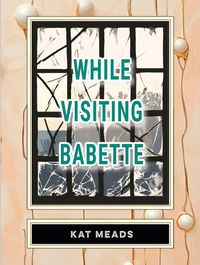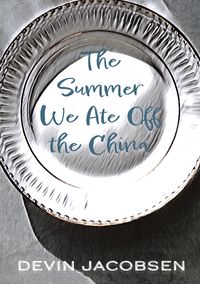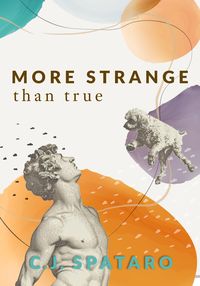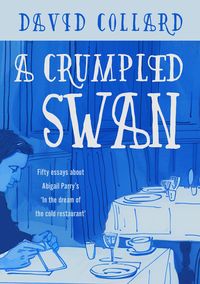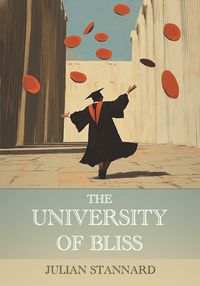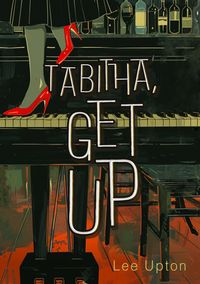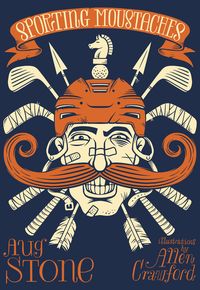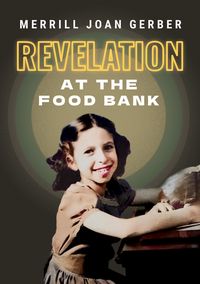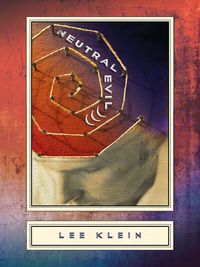News
☞ Kurt Luchs' Tributaries in Kirkus Reviews
“Luchs writes with a tone that is both pedagogical and inviting, balancing humility with the learned wit of a scholar. The author’s enthusiasm for the poets he discusses recalls a warm teacher eager to share an infectious passion for the subject…. [A]nyone who has tried to emulate the greats will find something deeply resonant in the author’s own creations…. A generous, witty guide for readers and writers alike that opens personal pathways to great poets. "
☞ Kat Meads' While Visiting Babette in The Sundress Blog
“Meads’s storytelling is enchanting due to its brilliant technique of feeding the reader just enough input to be tantalizing, a delicate balance in the space between repetitive and perplexing….While Visiting Babette is a book readers will think about days after they’ve finished reading it, reflecting on its nuances and happily accepting Kat Meads’s invitation to wonder about her characters, their mystical world, and the untethered facility tinged with darkness.”
—Tassneem Abdulwahab, in The Sundress Blog
☞ Lee Upton's Wrongful in Gnome Appreciation Society
“The writing is witty, the scene well set and like any good detective show it was addictive…. Give her a read if you aint done so already.”
—Jason Denness, in Gnome Appreciation Society
☞ The Summer We Ate Off the China in Heavy Feather Review
“In his beautiful and wide-ranging first collection of stories, The Summer We Ate Off the China, Devin Jacobsen, author of the novel Breath Like the Wind at Dawn, eschews a fashionable cool in favor of big language and deep feeling. Many of these stories wear their literary pedigrees openly…. [A]s Jacobsen shows in this wise collection, simply living your sort of shitty life requires its own kind of courage.”
—Jason K. Friedman, in Heavy Feather Review
☞ More Strange Than True in Cleaver Magazine
In Cleaver Magazine, Hannah Kroonblawd on C.J. Spataro’s More Strange Than True:
“The novel reads like Spataro had fun writing it; humor and joy are apparent throughout…. This is the kind of book best read in the sunshine or a warm pool of lamplight, a book you might pick up to read in a single afternoon or evening. Spending a few hours with Jewell, Oberon, and Titania brought me back to my own encounters with Shakespeare’s faeries and reminded me of the way storytelling can infuse an ordinary existence with just a little bit of its own magic.”
—Hanna Kroonblawd, in Cleaver
☞ John Patrick Higgins' Spine in the Dayton Daily News
Vick Mickunas on John Patrick Higgins’ Spine, in the Dayton (Ohio) Daily News:
“When I picked up a copy of Spine by John Patrick Higgins and quickly understood that this was a stream of consciousness memoir about his spinal injury and other agonies he has endured I really doubted I wanted to read it. Fortunately after a few pages I recognized the author has a warped somewhat gallows sense of humor…. [B]rutally hilarious….”
—Vick Mickunas, in the Dayton Daily News
☞ The Summer We Ate Off the China in Southern Literary Review
“[Jacobsen’s] thirteen stories are a dance between comedy and tragedy, and as eclectic as I’ve read in an extraordinarily long time…. Ageism, racism, trauma, rape versus consent, the fallout of school shootings, corporate soul-selling, marital angst—the list goes on and on, and all this under two hundred pages. The Summer We Ate Off the China is Americana unfiltered, for better or worse. Keep your eye on Devin Jacobsen.”
—Dawn Major, in Southern Literary Review
☞ Charles Holdefer's Don't Look at Me in Big Other
“[T]he perfect campus novel, with departmental in-fighting, post-grad rivalry, and the library as the hub of the most important action…. But Holdefer’s novel also subverts the genre … offering a twenty-first century twist, where the characters are aware that nobody outside academia cares a jot about what goes on inside…. While this is a well-constructed and eminently readable novel, it is at the same time breathtakingly audacious…. Don’t Look at Me is also a novel of our times, with much to say about growing up today. It has an anti-bildungsroman aspect to it: things never come right for Holly; she is never turned out as a finished adult, like a plaster figure from a mold. Her trajectory is a series of false starts, of interruptions and compromises, in love as much as anything else, and it ends not with a triumphant launch into the world of adulthood and a promising career, but with a sort of coda to her student days: having applied for a job—any job, anywhere, through a website that offers no more than a way out—she finds herself … living a sort of afterlife in a place attributed to her at random. Holly may have come of age, but she has no place in the world waiting for her…. Holdefer masters the art of the inconclusive conclusion, finishing the story, but leaving the reader with plenty to think about.”
—Helen E. Mundler-Arantes, in Big Other
☞ The Only Wolf Is Time in Gnome Appreciation Society
“It feels like Tremaglio has carefully written the book on ceramic tiles and then dropped them, he has carefully put them back together as best as he can remember, what we get is a mind-bending fragmented journey into grief…. Tremaglio has crafted something rather beautiful here … don’t they say that “from chaos comes beauty”?… [T]he sort of book you’ll end up reading a second time to see if it ends the same way.”
—Jason Denness, in Gnome Appreciation Society
☞ Nuala O'Connor on A Crumpled Swan in Books Ireland
“Collard has the affable, chatty, word-in-your-ear quality of the bright, original friend you most love to talk with, because of their vision, cheerful erudition, and inclusivity…. A wide-sweep book like A Crumpled Swan is never easy to sum-up, except to say it’s a read-with-a-pencil volume—Collard knows things—and if you care for literature, you will find plenty of juicy detail, apt quotes, and other entertainments. The author takes us on a breathtaking wander through the dream origins of poetry, to a meditation on what poetry is for, to an interactive lesson in linguistics….The book is, all at once, a cheerful guidebook, an idiosyncratic map, and an energetic paean, and it exudes Collard’s glee and pleasure in the work.”
—Nuala O’Connor, in Books Ireland
☞ While Visiting Babette in the Southern Literary Review
“This novella is ninety pages of sheer delight, a well-told story with a tender twist…. But be forewarned, for all its adroit charm (and it has tons), there is a poignant undertone…. Even if one did not know author Kat Meads is also a poet, one might suspect that from the lyrical, lovely phrasing.”
—Claire Matturro, in Southern Literary Review
☞ A Crumpled Swan in Never Imitate
“[B]oth intense and entertaining, offering as it does thoughts on Collard’s highly detailed interpretation on a line by line basis, and on poetry in general…. A Crumpled Swan is not a book to be rushed. There is much to consider and time should be given to allow reflection on Collard’s reasoning and exhortations. I gained much from my perusal including enjoyment. More than that, though, any reader will ever after carry with them the ability to read poetry through a clearer lens.”
—Jackie Law, in Never Imitate
☞ A Crumpled Swan in Quadrant
Lyn Ashcroft has a thoughtful essay on David Collard’s A Crumpled Swan in Australia’s Quadrant (paywall):
“In the process of examining Abigail Parry’s poem, Collard offers a refreshingly individual approach to poetry in the context of the Western world, especially the English-speaking Western world, as he discusses poetry’s characteristics, its pleasures, and the significance of its contribution to the enrichment of human life in general and of his own life in particular. He places no conventional academic wall of lofty impersonality between himself and his readers…. Collard is knowledge- able, entertaining and often very funny throughout the fifty essays which make up the book…. [which] is enlivened and enriched throughout (even in the footnotes) by Collard’s unfailingly acute sense of humour, that invaluable giver of perspective and joy, and even of Hobbesian sudden glory.”
—Lyn Ashcroft, in Quadrant
☞ In Hospital Environments in WordGathering
“Jake Goldsmith has gifted us with another epic. In this insightful collection of essays, Goldsmith shares his thoughts on ableism in the midst of the COVID-19 pandemic, toxic social media trends, and his deceased (possibly murdered) cat, Lemons. In all cases, he applies his knowledge of philosophy and his unusual perspective to offer readers a unique take on global events…. Wend Rend’s black-and-white drawings, often done in caricature style, perfectly compliment the text…. Goldsmith’s book thereby showcases the works of two gifted and insightful disabled artists (Goldsmith and Rend). It is a very fitting offering from the creator of the Barbellion Prize.”
—Kate Champlin, in WordGathering
☞ Wrongful in The Bookends Review
“It’s not often that a writer is equally adept at poetry, fiction, nonfiction, and literary criticism, yet Lee Upton has been an exception to the rule for over a decade. Unsurprisingly, her latest novel—Wrongful—only cements that fact, as it’s a thoroughly stirring and imaginative but realistic mystery/character study (in the self-aware vein of Agatha Christie) that exemplifies her many talents…. Wrongful is another triumph for Upton, whose captivating core mystery is realized through lovely prose and enhanced by a wide array of convincingly multilayered and morally shaky characters. If you’re already a fan of Upton, you’ll surely adore what she’s done here, and if not, you almost certainly will be as soon as you finish the first chapter.”
—Jordan Blum, in The Bookends Review
☞ John Patrick Higgins' Spine in Gnome Appreciation Society
“Higgins just brings out the maniacal laugh in me…. Well written, so easy to read and the funniest book of the year!”
—Jason Denness, in Gnome Appreciation Society
☞ The University of Bliss in the Canberra City News
Colin Steele has fun with Julian Stannard’s The University of Bliss:
“An over-the-top dystopian satire set in 2035 Britain. The narrative follows the arrival of the newly appointed vice chancellor Gladys Nirvana, whose very large salary is based on her expertise in “pure reflectivity”…. The Department of Wellbeing ensures that demoralised academics must stroke an increasingly depressed dog…. will undoubtedly resonate in academia.”
—Colin Steele, in Canberra City News
☞ John Baum on Lee Upton's Wrongful in Necessary Fiction
“Upton’s gift for smart and funny lines lighten the novel’s darkness…. As mysteries go, Upton has tapped a few cracks and added a few bends in a time-tested mould, which makes for a solid, surprising, and entertaining read. On the surface, this is a playful novel, but its heft comes from questions about art, reading, writing, and the darker side of human nature.”
—John Baum, in Necessary Fiction
☞ Dan Tremaglio's The Only Wolf Is Time in Heavy Feather
Ria Dhull on Dan Tremaglio’s The Only Wolf Is Time:
“Dan Tremaglio’s The Only Wolf Is Time is a novel told through fragments. These fragments initially seem like discrete objects, pulled in from all sorts of sources—some of these scraps are graffiti tags, some are photographs of sculpture, some are dictionary definitions or screenplay dialogue. There’s a little of everything. But the beauty of Tremaglio’s novel lies in his transformation of these objects. The fragments, although physically separated on the page, cannot be metaphysically separated from one another. Every fragment produces the following fragment and is produced by the preceding fragment; in this way, a narrative is formed—a narrative not written out on the page but formed on the page, pieced together in the style of a stained glass window…. [The Only Wolf Is Time] is a small cautionary tale … a fable, a single scene in a stained glass window. Tremaglio’s craft is astonishing.”
—Ria Dhull, in Heavy Feather Review
☞ Lee Upton's Wrongful in Kirkus Reviews
Kirkus Reviews on Lee Upton’s Wrongful:
“Upton’s novel operates quite effectively as an Agatha Christie–like whodunit, complete with a lineup of colorful suspects and a twisty conclusion. The narrative is further enriched by the author’s musings upon the illusory aspects of real life and fiction…. A captivating depiction of an elusive quest.”
☞ Devin Jacobsen's The Summer We Ate Off the China in Electric Literature
In Electric Literature’s a Spring small press roundup, Wendy J. Fox reads Devin Jacobsen’s new story collection:
“In this wide-ranging collection, the stories move from the American South to Europe and are knitted together with an indelible sense of longing. The characters have wants and needs, yet they are often as dissatisfied as the tourists who visit the Dalí Museum in Florida, and leave in a state of bewilderment. In The Summer We Ate Off The China, Jacobsen captures the human impulse to hope, and our inevitable disappointments.”
—Wendy J. Fox, in Electric Literature
☞ Anne Cunningham on Thomas Walton's Unsavory Thoughts
In her “First Chapters” column, syndicated in the Irish press, Anne Cunningham takes on Thomas Walton’s Unsavory Thoughts:
“[F]unny, and tragic and ironic and all shades in between…. wholly and spectacularly original. His seemingly chaotic spill of words is in fact marshalled out on the page with the precision of a surgeon’s scalpel and it’s a joy to see. Highly recommended.”
—Anne Cunningham, in The Anglo-Celt
☞ While Visiting Babette in Miracle Monocle
“The prose itself [is] straightforward in a way that reflects institutionalization itself—a soft surrealism in a hazy calm without distracting flourishes…. Like much of the vital heart of this story, the most important elements seem to shimmer just off the page, willing us to find them with a carefully averted gaze….[M]uch of the interest lies just between the lines, just out of sight….”
—Carrie Callahan, in Miracle Monocle
☞ Wrongful in Making Good Stories
Jen Paul gives 4 stars to Lee Upton’s Wrongful in Making Good Stories:
“The ending satisfactorily mirrors the beginning’s roving structure … while expounding on the baser emotions of greed, festering guilt, and desire for respect, adoration, and notoriety, that form more complex motivations…. In offering many characters as potential culprits, each of whom harbors possible reasons for acting against Mira, the story unfolds gradually, following Geneva’s dogged pursuit of uncovering the truth no matter the consequences or mishaps that arise. The literary, and generally artistic, lens applied throughout offered an easy entry point for viewing and relating with the various perspectives presented, as attaining recognition, if not praise or adequate remuneration, was an evident incentive driving events.”
—Jen Paul, in Making Good Stories
☞ Wrongful in MER
Emily Webbers reviews Lee Upton’s Wrongful in MER Literary:
“This is Upton’s ode to Agatha Christie mysteries. The novel starts with a dead body, and later another one turns up. There are also many characters, and the reader must puzzle together the real relationships between them and Mira and their true intentions because there is a killer in their midst. Wrongful is a fun read—a delightful mix of snark, quirky characters, and murder—where the reader gains insight into how we often fail to perceive others properly, how easy it is to get things wrong particularly when one is so desperate for answers, and when one wants to relieve themselves of guilt.”
—Emily Webber, in MER
☞ Julian Stannard's The University of Bliss in the Fortnightly Review
Anthony Howell is clearly having a good time in this Fortnightly Review article, “The University of Closed Minds: On Julian Stannard":
“Julian Stannard’s novel combines SF and satire. But the story it tells happily wanders off into Rabelaisian humour, fireworks of vocabulary and exuberant nonsense. Here William Burroughs meets C.P. Snow. Stannard is a poet, and his novel is the sort of book the reader can open anywhere and enjoy the lighting switches from one sentence to the next, the elusive allusive phrases…. The narrative is a clothesline hung with flimsy characters, often shat-upon by their robot hybrid pets, and it glories in its adjectival and acronymic subject clusters—breaking most of the rules about adjectives churned out so thoughtlessly by writing workshops. But the novel does not neglect drama…. Well worth a read, Brave New World for academia, if you like.”
—Anthony Howell, in The Fortnightly Review
☞ Gnome Appreciation Society on Lee Upton's Tabitha, Get Up
In Gnome Appreciation Society, Jason Denness raves over Lee Upton’s Tabitha, Get Up:
“Far more experimental than your run of the mill romance novel…. crammed with brilliant characters…. There are some challenging scenes of loneliness and depression and even at its darkest moments Tabitha’s humour shines through. There is a real nuttiness to this book…. Tabitha is the sort of person you can see bits of yourself in…. Moving away from chapter structures we have notes, lists, voicemails, texts, therapy sessions, email exchanges and panic attacks…. The funniest book I have read this year and it is gonna take some beating. Highly recommended.”
—Jason Denness, in Gnome Appreciation Society
☞ Devin Jacobsen's The Summer We Ate Off the China in The Big Issue
Patrick Maxwell on Devin Jacobsen’s stories:
“If for nothing else, you should read Devin Jacobsen’s short story collection The Summer We Ate Off the China for its wonderful prose…. We are in a similar, slightly deranged world to the early stories of Will Self. The grains of the ordinary are inverted and perverted…. This is a book about language and its power, and the more enjoyable and interesting for it.”
—Patrick Maxwell, in The Big Issue
☞ Devin Jacobsen's The Summer We Ate Off the China in the Times-Picayune
A review of Devin Jacobsen’s The Summer We Ate Off the China:
“[Devin Jacobsen has a] willingness to experiment. He’s not afraid to take out the English language for rambling country drives, his excursions sometimes touched by hairpin turns…. Perhaps no one since John Kennedy Toole has marshaled such a menagerie of characters and settings to tell a tale.”
—Danny Heitman, in The Times-Picayune
☞ David Collard's A Crumpled Swan in Publishers Weekly
Publishers Weekly chimes in about David Collard’s upcoming A Crumpled Swan:
“[Collard’s] meticulous exegesis illustrates how even a brief poem can contain untold layers of meaning. It’s a rousing celebration of the power of literature.”
☞ Devin Jacobsen's The Summer We Ate Off the China in the Village Voice
In the Village Voice, A review of Devin Jacobsen’s The Summer We Ate Off the China:
“A terrific collection—wide, deep, and way hipper than John Irving. Jacobsen writes about big issues and small towns, but he always writes beautifully…. a writer worth discovering.”
—Gideon Leek, in The Village Voice
☞ David Collard's A Crumpled Swan in Kirkus Reviews
Kirkus Reviews on David Collard’s forthcoming collection of fifty essays on poetry, A Crumpled Swan:
“50 brief, illuminating essays melding memoir, close reading, literary analysis, and cultural criticism…. Collard’s insightful essays reveal him, as well, as a sympathetic presence, sensitive and wise. Fresh, perceptive literary essays.”
☞ C.J. Spataro's More Strange Than True in Write Now Philly
In Write Now Philly, Ronan Brinkley “explores ownership vs. love” in C.J. Spataro’s More Strange Than True:
“Short, strange and sweet, More Strange Than True will break your heart and sew it back together again.”
—Ronan Brinkley, in Write Now Philly
☞ While Visiting Babette in Never Imitate
Jackie Law weighs in on Kat Meads’ While Visiting Babette in Never Imitate:
“While Visiting Babette is an intriguing novelette that sends the reader down a rabbit hole reminiscent of wonderland. Unlike Alice’s experiences, the various characters are human albeit with habits and outlooks that remain unexplained. This never detracts from what is a largely surreal snapshot of life inside a locked facility as experienced by the inmates…. Their world is one of doors and windows, of ponds and insects. There are games and stories, most of which make little sense except to the players. And yet the reader is carried through each of their thoughts and pursuits. Moments of violence are mostly tempered with a dash of piquant humour…. Original but also engaging. A rare little story that rewards careful reading.”
—Jackie Law, in Never Imitate
☞ Kat Meads on Writing While Visiting Babette
Books by Women has published an essay by Kat Meads about writing her novella, While Visiting Babette:
“Not to give too much of the plot away: someone does try to escape in While Visiting Babette. And that someone succeeds.”
☞ Fine in The Arts Fuse
Vincent Czyz in The Arts Fuse on John Patrick Higgins’ Fine:
“Higgins is a deft writer whose prose often displays a spare lyricism…. I doubt there’s a page that went by that I didn’t laugh at least once [but] the novel is not without tragedy…. While loneliness, aging, and death are overriding concerns in the novel, Fine also takes on the winner-take-all society Western capitalism has manufactured…. If you go ahead and pick up a copy of Fine, the worst that’s likely to happen is that some sentence, no matter the page, will make you laugh or giggle or chortle. The best? You get the laughs and, after turning the last page, you’ll find yourself just a smidge more reconciled to one day becoming Aunt Sylvia.”
—Vincent Czyz, in The Arts Fuse
☞ Julian Stannard's The University of Bliss in the TLS
W.J. Davies on The University of Bliss:
“The University of Bliss is a scathing satire of British higher education set in a dystopian near future. [Stannard’s grim comedy] is barely hyperbole…. The world that Stannard depicts is already here…. [A] ferociously funny condemnation of university commercialization and the tyranny of rankings, student satisfaction scores and bureaucracy run amok.”
—W.J. Davies, in Times Literary Supplement
☞ Kim Wiltshire on Julian Stannard's The University of Bliss in Everybody's Reviewing
Kim Wiltshire on Julian Stannard’s The University of Bliss:
“This is not just a book for those working in humanities in HEIs across the UK, this doesn’t just speak to that handful of Creative Writing academics who get asked ‘Yes, but what are you employability statisitics like?’ It is for anyone who values education, who values culture, who considers the world their children or grandchildren are going to inherit in terms of learning, philosophy, literature and art. It is a highly readable novel, biting, funny and fast paced, but at the same time, do take a pause every now and then to consider the world Stannard is creating—how close do you think we’re getting to that now?”
—Kim Wiltshire, in Everybody’s Reviewing
☞ Devyn Andrews on Kat Meads' in L'Esprit Literary Review
“In just over 100 pages, Mead’s lean but energetic story forgoes both extraneous plot detail and subjective self-reflection in favor of keen, outward-facing observation…. While Visiting Babette is largely propelled by Meads’ skillfully deployed powers of suggestion; no explanation is offered for the women’s institutionalization, nor is the work interested in taking up this thematic work as its mantle…. wonderfully playful.”
—Devyn Andrews, in L’Esprit
☞ Fine in Pop Matters
Reggie Chamberlain-King on John Patrick Higgins’ Fine:
“[A] witty debut novel…. The lines of action are as invisibly elegant and neatly crafted as any one of the writer’s beautiful sentences. Both gut-bruisingly funny and achingly sad. The line between the tragic and the comic is, of course, a fine one.”
—Reggie Chamberlain-King, in Pop Matters
☞ Gnome Appreciation Society on John Patrick Higgins' Fine
“It’s been a long time since a book has made me laugh this much…. Our main character is Paul Reverb, great name, seems nice enough, a gentle well meaning person and what follows is a series of ridiculous events. Paul is lonely, tragically so it seems at times, nothing seems to go his way, in fact things seem to become sentient enough to make sure they don’t go his way, from buying a coffee, meeting mates in the pub or a nice quiet toss in the privacy of his own lounge, when Paul puts his mind on a task you soon learn to spot the incoming catastrophe…. Absolutely wonderful book, great characters, funniest writing ever and if you ever wanted to get into the head of a horny lonely man then this is the book for you.”
—Jason Denness, in Gnome Appreciation Society
☞ The University of Bliss in the Westmeath Independent
Anne Cunningham, in her First Chapters review series, takes on Julian Stannard’s The University of Bliss:
“With many acid observations on how our hallowed halls of learning have plummeted into grimy halls of profit, and of how college deans have been persuaded to ‘fumble in the greasy till’ of questionable sponsorship and patronage, this funny, futuristic satire is one that’s not so much 2035 as 2025.”
—Anne Cunningham, in the Westmeath Independent
☞ Scientific American Recommends Lee Upton's Tabitha, Get Up
In its year-end list of 78 recommended books, Scientific American recommends Lee Upton’s novel:
“This book is delightful for readers and would-be writers alike. The main character is trying to kick-start her career as a biographer, and her ups and downs are unexpected and entertaining. Think Diane Keaton in the 2003 movie Something’s Gotta Give.”
—Maria-Christina Keller, in Scientific American
☞ Julian Stannard's The University of Bliss in The Spectator
Brian Martin reviews Julian Stannard’s The University of Bliss:
“[Stannard delivers] a devastating evisceration … The University of Bliss belies its title. This is a work of high satire and Stannard vents his frustration with more than a touch of Swiftian saeva indignatio. His ridicule is extreme and addictively readable.”
—Brian Martin, in The Spectator
☞ More Strange Than True in Glassworks
“As the Bard himself once said, ‘The course of true love never did run smooth,’ and that certainly is the case in C.J. Spataro’s debut novel, More Strange Than True, a story of fairy mischief in truly Shakespearean proportions. Instead of existing merely as a retelling of a beloved classic, the novel luxuriates in themes from A Midsummer Night’s Dream, expanding on and complicating them and sometimes rejecting them entirely…. [A] feminist take on tropes that are so old, they almost seem to be natural occurrences. Spataro’s work is complex and delightfully odd.”
—Emilee McIntyre, in Glassworks
☞ Sporting Moustaches in the Daily Nutmeg (New Haven)
“A brow-raising book of short stories…. [Stone employs a] density of wordplay … to keep readers delighted and surprised. His approach prompts thoughts of Nikolai Gogol’s absurdist short story ‘The Nose,’ while his sly nods to cultural touchstones as varied as Back to the Future and Bela Lugosi add modernist ridiculousness in the best of ways. In Sporting Moustaches, there are no appearances from famously moustachioed real-life athletes like Rollie Fingers, Mike Ditka or Dale Earnhardt Sr…. But the creative athleticism required to knit together this many hirsute sports yarns would have made them proud.”
—Daniel Fleschner, in The Daily Nutmeg
☞ Necessary Fiction on Lee Upton's Tabitha, Get Up
“Like the best comedy, Tabitha, Get Up contains deep feeling behind the sharp quips and humorous antics…. Joy and levity accompany Tabitha as she learns to make her life her own and decides to live it.”
—Ceillie Clark-Keane, in Necessary Fiction
☞ Merrill Joan Gerber's Revelation at the Food Bank in Hippocampus
Plaudits for Merrill Joan Gerber’s essays in Hippocampus Magazine:
“A pleasure to read…. Her own fine writing makes each essay a jewel, packed with delicious turns of phrase.”
—Vicky Mayk, in Hippocampus Magazine
☞ W. D. Clarke on Lee Klein's Neutral Evil )))
W. D. Clarke’s long and thoughtful review of Lee Klein’s Neutral Evil ))), is well worth a read:
“Long after finishing it, I find myself still thinking about this—let’s not call it autofiction—digressive apologia pro vita sua and meditative, measured assessment of self, family, and culture. And, above all, this is not so much an account but a demonstration of how the artist resists the pull of the ’neutral evil’ of the world by harnessing the chaotic good to be found in it, in his or herself, and in other works of art…. Lee Klein shows us, embodies how the humble art of art is done, via memory, dream, reflection.”
—W. D. Clarke, "The Art of Resistance"
☞ Kirkus Reviews on Lee Upton's Tabitha, Get Up
Kirkus Reviews weighs in on Lee Upton’s Tabitha, Get Up:
“Upton’s prose is razor-sharp—as filtered through the unpredictable and slightly delusional perspective of Tabitha, it takes on a magical, frenetic quality…. Though many madcap events occur, it’s Tabitha’s humorous and hypnotic voice that propels the story. A delightfully meta novel about a woman writing her way out of calamity.”
☞ Sporting Moustaches in the Cyprus Mail
“The brazen pun in the title makes clear that Stone’s book is here to play, subtlety be damned. In fact, so exuberantly madcap are the stories that when read continuously, Sporting Moustaches feels like being gently bludgeoned by a tender lunatic…. there’s no let up…. Relax, read as and when the humour takes you, and forget rules. Just enjoy the sweet derangement….”
—Simon Demetriou, in Cyprus Mail
☞ Aug Stone's Sporting Moustaches in Vol1 Brooklyn
Sporting Moustaches made Vol1 Brooklyn’s “Books of the Month":
“Aug Stone explores the absurd place where sports and facial hair collide, and it’s like nothing you’ve read before.”
☞ Charles Holdefer's Don't Look at Me in Sports Literature Association
“Tender subjects such as cancel culture, harassment, and fetish are addressed in this novel with a delicate recklessness that represents the clashing of two ideals: the first is the need to be politically correct with a surface level sense of morality; the second is the need to see the humanity in each individual, which is a deep-rooted sense of morality that transcends the passing of philosophical trend cycles. Holdefer writes from the interior of the characters, even the problematic ones, which gives them shape as three-dimensional, somewhat redeemable characters, despite their flaws.”
—Aurora Blanchard, in Sports Literature Association
☞ Charles Holdefer's Don't Look at Me in Dactyl Review
“Don’t Look at Me is a satire as generous as it is sharp. Focused on a person who is dealt a strange hand by fate, the book is quirky, and the characters are odd, and it works because the balance is absolutely sure. This is the secret of its enchantment. Catastrophe leads to quiescence, and quiescence to risk-taking. The pattern is shot through the novel, and it is lovely to experience.”
—Vic Peterson, in Dactyl Review

